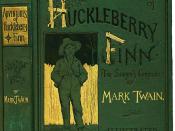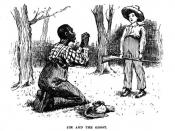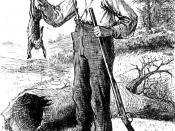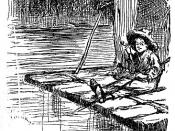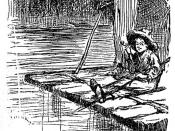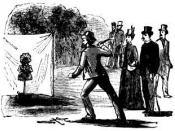The combination of childishness and maturity in Huckleberry Finn must be closely followed throughout the novel. We are constantly looking at Huck's juvenile mentality and the undertone of a maturing young man. Readers get the first impression that Huck is a mischievous little hillbilly lad who indulges in his childish impulse. There are several factors that give the reader the sense that Huck is all of 11 or 12 years of age. Such factors include: his superstition about silly thing like spilling salt or killing spiders. He joins Ton Sawyer's band of make believe "robbers" and practices the art of ditching school. Most all of these occur fairly soon in the novel. As the story progresses, Huck begins to sway towards a more mature, heightened quality of thoughts and actions. The reader starts to see the development of an independent young adult. He holds more respect for the adults that he encounters, showing them politeness and submission that he lacked earlier, as with the widow and Miss Watson. He prefers to be the peacemaker rather than bicker, even if he knows that someone is wrong or lying, as when he knows of the king and the duke_s deceit. The reader learns that his actual age is about 13 or 14 and it is now not doubtable.
He shows a great amount of chivalry by trying to help save the girls from the king and the duke's plan to steal their inherence money left by their deceased father, even though he was risking his own safely in doing so. And in the midst of all that had happened, he still pities the king and the duke as they are tarred, feather and ran out of town. Holding these two contrasting thoughts in his head shows a great growth in his moral character. Perhaps the most significant turning point for Huck is when he abandons the care of how society would look upon him for helping a run-away slave and he obeys the call of loyalty to his friend. Having an abusive, uncaring father, Huck learns to admire James for the loves he has for his wife and daughter. These are just a few small samples of the changes that Huck endured developing himself. Many people say that the ending was the most disappointing aspect of the novel: "It seems as though through all the situations, that Huck is growing up and accepting his innate idea of right, when in fact he hasn_t grown at all. In the last chapter after everything has been clear up and set straight, Aunt Sally wishes to adopt Huck and unfortunately, Huck is against that idea. "But I reckon I got to light out for the territory ahead of the rest, because Aunt Sally she's going to adopt me and sivilize me, and I can't stand it. I been there before." I don't find myself agreeing with this concept. Huck does play along with Tom's little game of make believe in the end, but I feel it is more out of the trust Huck has for his friend, Tom, rather than out of credence. Lastly, when he complains of Aunt Sally wanting to "sivilize" him, his independent notions of a growing lad shines through. He feels this way because of his lust for freedom and adventure, not childish rebellion or ungratefulness. In conclusion, Huck's growing maturity in the story is portrayed through his break away from common society and his caring, selfless sprit.
